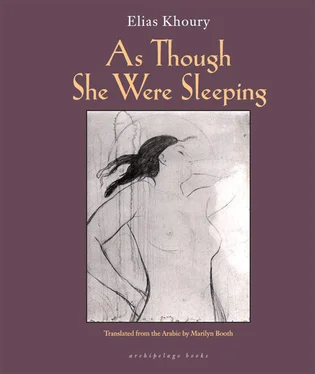Milia stands among the mourners revering Amin’s shrouded bier. No tarbush graces it but rather a four-colored flag drapes over it; later on Milia would learn that this was the flag of Palestine, the flag born in the great Arab Revolt against the Ottomans, led by King Faisal, whom Milia had dubbed King of the Hotel Massabki. Green and white, red and black: Mansour explained to her that the four colors were those of the ancient Arab states that had ruled this land one after another. The colors of the flag gave material reality to a poetic couplet in which the medieval poet Safi el-Din el-Hilli expressed the manner in which these colors became the emblem of the Arabs’ wakefulness, a legacy of the ancient Arabs’ boldness and persistence.
White are our works, and black are our battles
Green are our fields, and red, every blade
Their boldest claims the world saw as true
At their summons, “Thus it is!” History bade
Milia did not like this one. It’s a long way from true poetry, she said to Mansour.
At the church she noticed a cluster of blue-eyed, light-complexioned men standing at the front with the family as they received condolences. They were Husaynis, Milia realized, relatives of Haajj Amin, the mufti of Jerusalem, and a leader among Palestinians. Their presence announced to all that Amin Hourani had died a martyr to the homeland. For he had put the foundry and hardware business inherited from his father at the service of the uprising, ready to resist the British Mandate and the Zionists. She sensed the odor of death at hand. For the entire week she spent at the family home in Jaffa, not once did Milia remove her protective hand from her belly, as though she was determined to protect the baby from the dangers threatening it. At church, the short, light-haired man who was said to be a cousin of Haajj Amin’s stood next to Mansour and, even at home, would not leave his side. Why did these men look the way they looked? Milia wanted to ask. They seemed so like the French, or at least as she imagined the French to look. But she asked no questions. She sensed a misfit of things and images, and said nothing. What kind of sense did it make, that a grandson of Crusaders was resisting the new crusaders who had occupied Palestine and were trying to hand it over to the Jews? Later, Milia understood that the Husaini family had ancient Arab roots; pale complexions and blue eyes were not the monopoly of the Europeans. Remembering how the poetry of the ancient Arabs extolled cream-complexioned women in one seductive line after another, she smiled at her own naiveté.
When Milia married she did not think about what awaited her in a country plummeting into an infernal abyss.
I didn’t think about it because I didn’t know, she would say. But my brothers — why didn’t it occur to them? Perhaps it did, but they saw this as the only way to marry me off and be rid of me.
After the tale of Najib and his little birds, Milia had felt increasingly that her presence was becoming heavy at home, that she was taking up too much space. The tempest over Salim and his two wives — as Saadeh persisted in calling Salim’s wife and her sister — had died down. All mention of Salim vanished, as if he had never existed, and Niqula assumed full responsibility for the household. He ruled with a fiery-red fist, the shadow-image of the red tarbush he had claimed and seized after the death of his father, which would not budge from his head until his own death. Milia — mother and sister, as they called her — had to go. Her own mother’s eyes said so as did the looks her brothers gave her. Even Musa began to distance himself from his older sister; he no longer knew what to say to her. Life is simply like that: it changes, and its channels narrow, into weariness and anxiety. Milia felt confined, and as wretched as could be. Her dreams had turned into suffocating moments when she felt herself lost in darkness and cringing as little birds flew past. Her rib cage felt compressed and she felt herself moving through airless space. She was a lost young woman plunging into the void. Walking along the edge of the wadi, she watched herself pitch forward and fall, as if the little Milia who appeared in her dreams had forgotten how to walk. More and more, her dreams were a succession of painful falls, until one morning she was unable to rise from her bed, so stricken was she by the pain shooting through her back and legs brought on by repeatedly falling as she walked down the dusty unpaved track. Milia decided to take a cane along into her dreams, and she laughed at the possibility of it.
I wish life were like this, she said to her husband.
Like this — meaning what?
Meaning, like I dream it to be. Like, something comes into my head that I want to take with me into the dream, and there it is.
She told him about the dream of the cane that saved her from falling on the pathways of the night and gave her the ability to endure a cramped and anxiety-ridden existence — for life did not reopen its doors to her until Mansour and the blue woman appeared on her horizon.
I wish we could go back to our time at the Hotel Massabki, she said.
Why?
Because then your brother would not have died, and we would not have to go to Jaffa.
Mansour got her to understand that the decision about Jaffa was irrevocable. He could not alter it, he said. All his life he had fled from the reality of things; his brother had faced it alone. Now he has died, said Mansour, and I must do what has to be done.
And then? What will happen then?
And then — it’s impossible for it to happen, he said. The Jews want to throw us out of our own country. Can you believe that?
It’s unbelievable, she said. But what can we do about it?
We can fight.
And if we fight, can we really change anything? Because it’s. .
Because it’s what? he asked her. Don’t tell me you dreamed the Jews took the country and threw us out!
No, I didn’t dream it, she said, and was silent.
Milia did not want to leave Nazareth. She had tried and tried to win over Mansour but it was no longer possible to talk with him. He put an end to words by slipping into his brother’s skin. And the end of words meant the end of everything. Logic said he could not abandon the foundry; that the mother could not run it on her own. But an opposing logic said Mansour could not work with his mother because she was so domineering and also because his brother had kept the entire business to himself without clueing Mansour in. Milia could not say that Mansour had been a coward or had claimed to flee Jaffa out of fear. He told her that he had preferred to get away from the atmosphere there, to avoid headaches, but those headaches had pursued him all the way to their home in Nazareth.
Yet Amin’s story remained obscure for Milia. Well, not exactly: she had dreamed something that night but told no one her dream. She was afraid; she believed the figure she had seen might be Musa. Her eyes were swollen and sore when she awoke. She had dreamed herself crying, she said. She did not get up to make coffee. She told Mansour she did not feel well and was tired. She pretended to sleep until he left the house and only then she got up. She rinsed her puffy eyes and did not leave the house. She was too afraid of encountering that elderly man and bursting into tears once again. She had cried seeing Tanyous lying full length on the ground, his belly inflated and flies swarming around his body. She tried to stop people on the incline that led to the Church of Our Lady of the Tremblings to tell them that the man had died and must be carried to the cemetery. No one paid any attention to the stiff and motionless little girl with the huge wide-open eyes that suggested she was waiting hopelessly for her mother. Men filled the narrow street, marching shoulder to shoulder; no one stopped. Then suddenly out stretched a hand holding a pair of scissors and clutched a handful of her short hair. Blackness began to rain into her eyes and she no longer saw anything, then she began to cry.
Читать дальше












